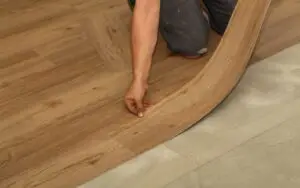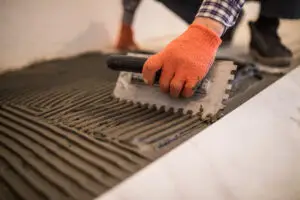Understanding Flooring Installation Labor Costs
Key Factors Influencing Labor Costs
Type of Flooring Material
The type of flooring material you choose has a significant impact on labor costs. Different materials require varying levels of skill, time, and specialized tools for installation. For instance, hardwood and tile installations often demand more expertise and precision than vinyl plank or carpet, which will be reflected in the labor costs. Professional installers have the skill and expertise to handle all types of flooring installations, and will always be able to provide you with an accurate quote.
Size and Complexity of the Project
The size and complexity of your flooring project also affect the labor costs. Larger spaces, oddly shaped rooms, stairs, or intricate patterns will require more time and effort from the installers, thus increasing the labor charges. Projects that involve multiple rooms, or require custom cuts, will also lead to higher labor costs. Professional installers will always factor all of these issues into their initial estimate.
Subfloor Preparation Requirements
The condition of your subfloor is another critical factor. If the subfloor needs extensive preparation work, such as leveling, patching, or moisture remediation, labor costs will be higher. Properly preparing a subfloor is essential for the longevity of the flooring, and always requires professional tools, skills and expertise. Professional installers know how to correctly assess the condition of the subfloor, and will make sure it is perfect before any flooring is installed.
Average Labor Cost for Flooring Installation
National Averages
The average labor cost for flooring installation in the USA generally ranges from $1 to $8 per square foot. This range can vary widely depending on several factors, including the type of flooring material, the complexity of the project, and the regional cost of labor. It’s important to get a detailed quote from your local professional installer to get the most accurate estimate possible.
Regional Differences
Labor costs for flooring installation vary considerably across different regions of the USA. Areas with a higher cost of living, and higher demand, usually have higher labor rates than areas with lower costs of living. It’s wise to research the local rates to get a better sense of what you might expect to pay. Professional installers are always very familiar with the regional rates, and will always be competitive.
Labor Cost Breakdown by Flooring Type
Average Labor Costs for Hardwood
Installation Complexity
Hardwood flooring installation is generally considered one of the most complex, and typically comes with higher labor costs. The process requires precise measurements, careful cutting, and proper fastening techniques. Additionally, hardwood installation often requires extra steps, such as acclimation, and the correct use of specialized tools. This complexity results in higher labor costs, but also provides a durable and beautiful flooring solution.
Special Considerations
Hardwood installation may require extra steps, such as subfloor leveling, moisture barriers, or unique patterns, which can also increase labor costs. It’s important to discuss all of your options with a professional installer, so that all of these costs can be accounted for in the initial estimate. A professional installer will always provide the best results, regardless of any special considerations.
Average Labor Costs for Tile
Installation Complexity
Tile installation is another complex process that typically comes with higher labor costs. It requires a lot of prep work, such as leveling and waterproofing the subfloor, and requires precise cuts, correct spacing, and skilled grouting techniques. The labor cost for tile installation also varies based on the tile type and pattern. These complexities mean that tile is best left for professional installers.
Special Considerations
Tile installation also requires special tools such as a wet saw, grout float, and sponges, which add to the overall cost if these tools have to be rented. More complex tile patterns, such as mosaics, will increase the labor costs as well. These types of installs are a specialty of professional installers.
Average Labor Costs for Vinyl Plank
Installation Complexity
Vinyl plank flooring is generally easier to install, which makes it a popular choice with many DIYers, and it also tends to come with lower labor costs than hardwood or tile. However, proper subfloor preparation, accurate measurements, and correct installation techniques are still necessary to ensure a high quality install. While a professional installer will still cost more than a DIY install, it is usually worth the cost, since it reduces stress, and provides a great looking and long-lasting installation.
Special Considerations
While vinyl plank is often easier to install than other flooring options, there can still be some special considerations, such as stairs or unusually shaped rooms, which can add to the overall labor costs. A professional installer can quickly overcome any challenges that might arise, and provide an accurate and detailed quote for your project.
Average Labor Costs for Carpet
Installation Complexity
Carpet installation often has lower labor costs compared to hardwood or tile, but it still requires skill and the correct tools to achieve a smooth and secure fit. The process typically includes removing the old carpet, prepping the subfloor, installing padding, and stretching and securing the new carpet. These are skills that professional installers have spent a lot of time perfecting, which will always provide a better result than any DIY install.
Special Considerations
More complex carpet installations, such as those involving stairs or custom patterns, will lead to higher labor costs. Professional installers have the right tools and knowledge to perform any type of carpet install, and ensure a beautiful and durable end result, regardless of special considerations.
DIY vs Professional Flooring Installation
DIY Installation: Potential Savings and Risks
Potential Mistakes and Rework
DIY flooring installation can seem like a way to save money, but it’s important to consider that DIY installs are more prone to errors, and often require costly rework. Incorrect subfloor preparation, misaligned planks, or improper cutting can lead to a poor final result, that is less durable, and may require expensive fixes. Professional installers will always provide the best results, with no unnecessary problems, and no costly rework.
Hidden Costs and Time Investment
DIY flooring installation also comes with hidden costs, such as the need to purchase or rent specialized tools, materials, and the additional time that is needed to perform the install. These hidden costs, combined with the potential for mistakes, make it more cost effective to hire a professional installer.
Professional Installation: Benefits and Advantages
Expertise and Efficiency
Professional flooring installers have the expertise, knowledge, and tools to install flooring correctly and efficiently. They use the best techniques, and methods that provide a durable and long-lasting result. Their experience and skills allow them to complete projects much more quickly than a DIYer, and with minimal disruption to your home or business.
Long-Term Savings and Value
While professional flooring installation might have a higher upfront cost, it often results in long-term savings. By avoiding costly mistakes and ensuring a proper installation, professionals prevent future repairs or replacements. Professional installers also offer warranties on their work, which provides a level of security that is not available with a DIY install.
Case Studies: Labor Costs and Results
Example of Costly DIY Mistakes
A homeowner attempted a DIY hardwood flooring installation to save money on labor costs. However, due to improper subfloor preparation and incorrect cutting techniques, the floor was uneven, had large gaps, and was not aesthetically pleasing. The homeowner ended up having to hire a professional to redo the entire project, costing them more in the long run, than if they had hired a professional to begin with.
Example of Efficient Professional Install
Another homeowner hired a professional installer for their tile flooring project. The installer used the correct techniques, tools, and knowledge, to correctly prepare the subfloor, install the tile, and properly grout the new floor. The result was a beautiful and durable floor, and the project was completed quickly and efficiently. The homeowner was pleased with the stress-free process, and was very glad they had chosen to hire a professional.
FAQs & Answers
The average labor cost for flooring installation in the USA ranges from $1 to $8 per square foot, depending on the type of flooring, the complexity of the job, and your location. While DIY installations may seem cheaper upfront, they often come with hidden costs and the risk of mistakes that professional installers can prevent. Hiring a professional ensures a high-quality installation that lasts, and also saves you from any unnecessary headaches.
Different flooring materials require varying levels of skill and time for installation, which directly impacts labor costs. For example, hardwood and tile often have higher labor costs due to their complex installation processes. Whereas, vinyl plank is often on the lower end of labor costs due to its ease of installation. Professional installers have the expertise and skills to handle all of these flooring types, which can save you time, money, and stress in the long run.
Other key factors include the size and complexity of the project, the condition of the subfloor, the need for removing existing flooring, and your geographic location. These factors can all affect the final cost of the project. Professional installers always account for all of these factors when they provide you with a quote, ensuring that you receive an accurate and competitive estimate.
While DIY flooring installation might seem like a cost-effective choice, the risk of making costly mistakes is high, especially when it comes to proper subfloor preparation, alignment, and cutting. Professional installers have the knowledge, experience, and specialized tools necessary to avoid these issues and ensure a durable, high-quality, and long lasting install. Hiring a professional installer often saves you money, and also protects you from any unnecessary stress or frustration.
Professional flooring installation services often provide warranties that cover both the materials and the installation labor. This offers peace of mind, as it ensures that if any problems arise with the installation, the professional installer will address them, with no extra costs to you. Most DIY installations do not come with any warranty, meaning all risks are on you. Professional installers are trained to do the job right the first time, and always stand behind their work.





